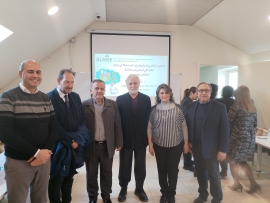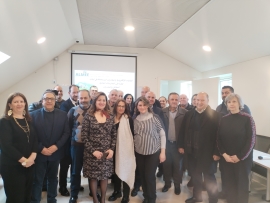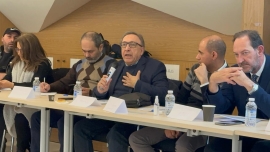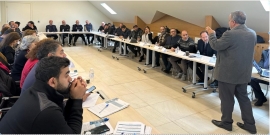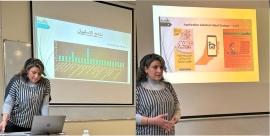projects
On-going and executed projects:
-
EU project MeetMED I (2018-2020) and MeetMED II (on going): “Mitigation Enabling Energy Transition in the Mediterranean region”. This project is developed by the Mediterranean Association of the National Agencies for Energy Management (MEDENER) and the Regional Center for Renewable Energy and Energy Efficiency (RCREEE). Following the success of its first phase, MeetMED II aims to enhance the energy security of beneficiary countries (namely Algeria, Egypt, Jordan, Lebanon, Libya, Morocco, Palestine and Tunisia). While fostering their transition to low economy. Accordingly, MeetMED II will be contributing to the creation of more stable, efficient, competitive and climate-resilient socioeconomic contexts in the targeted countries. MeetMED II activities aims at strenthening the implementation of EE measures and improving countries' energy mix focusing on building and appliances' sectors through multiscale, multipartner and inclusive approach at local and regional levels, thereby fostering regional coorperation. http://meetmed.org
-
The project SOCLE: “Soutien Opérationnel aux Collectivités Locales Libanaises pour l’Environnement”, 2019-2021. https://bt-villes.org/fr/projet-177-projet-environnement-socle. The project aims to:
- Support the Lebanese Ministry of the Environment through Lebanese territorial authorities to reduce the impact of the Syrian crisis on the environment;
- Strengthen the capacity of Lebanese municipal teams and strengthen the Municipal Institution in the management of environmental issues;
- Promote the use of renewable energy to Lebanese local authorities;
- Assist Lebanese local authorities in setting up and drafting pilot projects to address their environmental challenges;
- Highlight the expertise present in the Loire region to use the project's objectives;
- Network Lebanese actors and Ligerian actors (public actors, companies, etc.) for the implementation of the project, and to lay the foundations for sustainable cooperation, which can continue beyond the implementation of this project.
The project was led by the Loire Country Region, United Cities Lebanon/Technical Office of Lebanese Cities, the Network of Lebanese Communities members of UCLG and consortium partners include also the Lebanese Ministry of Environment and ALMEE.
-
The “Lebanese Youth as Messengers for Sustainability” project fosters a culture of sustainability among the Lebanese children and young, their families and the local communities, in order to enhance a sustainable development in the country and sustainable relationships in the Mediterranean region. The Project deals with four different dimensions of sustainable development, in a wider framework of promoting the empowerment of citizens contributing as such to socio-economic development and better living conditions. They are: i) the important role of the education ii) the values of citizenship and civic engagement to be enhanced among people, iii) the cultural and ethical dimensions of sustainable development, iv) the local and global dimension of sustainable development.http://www.medies.net/staticpages.asp?aID=893&overRideCategory=1
The project was led by the Makhzoumi Foundation and consortium partners include also OMSAR, CERD, ALMEE, MIO-ECSDE (through MEdIES), and ARMADILLA.
-
EU project ENEPLAN: "Developing skills in the field of integrated energy planning in Med Landscapes". In the framework of the Erasmus “Capacity Building in Higher Education” program, the ENEPLAN project was conceived to address the lack of interdisciplinary approaches in higher education on energy planning and RES development in Mediterranean areas, by increasing the capacities of future professionals through innovative ICT-based educational approaches, able to integrate different disciplines (spatial planning, environment, engineering, landscape) and foster collaboration with research and business activities in the RES sector, thus keeping up with its rapid technological innovation. %u2028To attain this goal, ENEPLAN proposes an alternation of desk activities and workshops aimed at the collective production, development, testing and practical application of Open Educational Resources on energy planning, based on the tool of collaborative Concept maps.
- EU project MED-ALGAE: "Production of biodiesel from Algae in selected Mediterranean Countries". In the framework of the ENPI-CBCMED program, MED-ALGAE the project aims at enhancing regional and cross border collaboration for the development of a new generation of biofuels from microalgae. A growing concern of today’s society is finding an alternative fuel to replace petroleum products and to reduce greenhouse gas emissions. One of the main problems with biodiesel is being able to generate enough feedstock to produce it. A solution to this could be to cultivate microalgae. Microalgae have a higher yield of oil production than crops [1]. This project aims to produce biofuels (biodiesel) (a renewable fuel) through cultivation of microalgae. This is a new technology project and can contribute to the requirements of a long term strategy according to the recently adopted by the European Commission “Climate Change and Energy Package”. Please visit the following link to access the full list of project deliverables: https://www.idaea.csic.es/medspring/link/med-algae-project
- EU project CLEANERTEC: “Toward clean Energy technologies and innovative environmental solutions in Lebanon”. COSV is a voluntary organization operating in Lebanon since 2006 mainly in the sector of solid Waste Management. Through the funds of the EUROPEAN UNION, and thanks to a close collaboration with OMSAR and Baalbek Municipality, COSV, and in collaboration with ALMEE as a partner, aims to enhance the use of green and renewable energies in Lebanon, through the implementation of pilot and demonstrative projects, developing policies, legislative and regulatory frameworks, building the capacities of key actors at the public administrative level and raising awareness of the local population. The overall objective of the current action titled is to promote clean, environmental friendly energy technologies, and facilitate cooperation on technology aspects, disseminating to the relevant stakeholders in Lebanon. For more information, go to http://www.cosv.org projects/environment.
- EU project RCREEE: The project is part of RCREEE’s overall effort of providing member state administrations with better information and new planning tools and processes. It supports RECREEE in the development of a website which offers access to a complete subject-ordered list of member state RE&EE laws and regulations, reviewed policy documents, selected background and evaluation reports deemed to represent state-of-the art high quality analytical work as well as discussion blogs on topics deemed to be of general interest for RCREEE governments. http://www.rcreee.org gives general information on RCREEE and its activities.
- EU FP7 project RESSOL: The project’s objective is the engagement of the beneficiaries from the MPCs (ALMEE and NERC) in high quality research and, thus impacting on the national energy efficiency and renewable policies as well as contributing to the development of well established partnerships, scientific relationships and networking with the research institutes, groups and consortia within EU countries. http://www.ressol-medbuild.eu
- EU (INCO) project: REACT: "Self-Sufficient Renewable Energy Air-Conditioning Systems for MPC". Web address: www.crear.unifi.it/react
- EU (INCO) project: DISTRES: Promotion and Consolidation of all RTD Activities for Renewable Distributed Generation Technologies in the Mediterranean Region. The overall goal of the DISTRES co-ordination action project is to exchange and disseminate good practice developed in the field of renewable energy sources distributed generation (RES-DG) technologies by isolated research activities and perform studies and/or analyses for the Mediterranean needs. DISTRES is a three year co-ordination action project. Since solar potential is an abundant commodity in the Mediterranean region the area of interest of DISTRES will be primarily on the electricity produced from solar energy (photovoltaic and/or solar thermal concentrating systems) from DG systems.
- EU (INCO) project RAMSES: "Renewable Energy Agricultural Multipurpose System for Farmers". The project aims at bypassing all the problems related to the progressively increasing prices of fuels derived from fossil resources. This increase in prices is especially damaging for agriculture. Modern agriculture is heavily dependent on fossil fuels for agricultural vehicles, machines, processors, etc. Farmers everywhere in the world have been badly hit by the increase in fuel prices, especially since agricultural fuels are often not taxed, or only lightly taxed, so that the burden of every increase in prices in the world market hits directly farm’s finances. This project is aimed to giving rural communities on the Southern bank of the Mediterranean area a new tool to assist them in their agricultural work: an integrated solar power system which includes battery storage, usable as to power an all purpose vehicle.
- EU (INCO) project HYPA: Euro-Mediterranean renewable energy partnership. Web address: www.hy-pa.org
- EU (INCO) project SOLATERM: "Promotion of a New Generation of Solar Thermal Systems in the MPC". Web address: http://ioffice.gtz.de/solaterm
- EU (INCO) project SOLAR BUILD: "Integration of Solar Technologies into Buildings in Mediterranean Communities". SOLAR-BUILD will contribute significantly to uptake of solar technologies to meet cooling, electricity & heat needs in buildings in Mediterranean communities, via new links & information exchange between relevant professional fields & via transfer & adaptation of experience from EU to Mediterranean countries. Partners are leading networks of sustainable energy professionals & architects within the region. Partners will engage with extensive market actors & stakeholders including: architects, building engineers, solar technology manufacturers / retailers etc, local authorities / municipalities, central government departments.
- EU (SMAP program) MED-ENEC: "Promoting Energy Efficiency in the Construction Sector ". The project is addressed to the MEDA countries Algeria, Egypt, Israel, Jordan, Lebanon, Morocco, Palestinian Territories, Syria, Tunisia and Turkey. Web address: www.med-enec.com
- French GEF framework project PEEC: Energy Efficiency in building in Lebanon. This bilateral project goes under the French GEF framework and was financed (1 million euro) by the FFEM (fonds Francais pour l’Environment Mondial). The objective of the project was to demonstrate the technical and economic feasibility of energy improvements in apartment buildings. Through the results of this demonstration, through awareness rising among Lebanese leaders and through capacity building, the project launched a policy for energy efficiency in housing.
- EU (SYNERGY program) project "Euro-Mediterranean Energy Policy Training Network" . The project proposes the establishment of a mechanism in the form of a Mediterranean Energy Policy Training Network, extending over all Mediterranean Partners, providing specialized services in a decentralized yet coordinated manner, enhancing the implementation of the Action Plan of the Euro-Mediterranean Energy Forum 1998-2002. The ultimate success of the Network was judged upon the effectiveness of the dissemination of the European energy policy know-how to the Mediterranean Partners as well as upon the adoption by them of common International practices in the field of energy projects financing. http://www.ec-ramses.net
- EU (SYNERGY program) project with the National Technical University of Athens – EPU "Business Opportunities for CDM Project Development in the Mediterranean". The project aims at the implementation of the Kyoto Protocol, mainly in Capacity Building and Development of common understanding of the Kyoto Mechanisms, Energy Efficiency, Development of Mechanisms for Funding Investments in Clean Technologies and Promotion of renewable Sources of Energy.
- EU (SYNERGY program) project with the MEDENER network CDM-ANVIMAR: "Analysis of Viability of the Clean Development Mechanism in the Mediterranean Area". Web address: www.cdm.anvimar.info
- EU (MEDA program) regional project with the MEDENER network ATSEMB: "Application of Thermal Solar Energy in the Mediterranean Basin". Web address: www.solarmed.net
- EU (synergy program) regional project with IDAE (Spain) "How to Develop Energy Services Companies (ESCOs) in the Mediterranean Countries".
- EU (synergy program) regional project with IDAE (Spain) "Energy and Urban Environment in the Mediterranean Countries".
- EU (INCO program) project SUSTENMED: "Dissemination of Sustainable Energy Technologies in the Mediterranean Basin".
- EU (DG17 program) project Energy Policy Dialogue: bilateral project between the European commission and the Lebanese government. ALMEE was subcontracted by Hagler Bailly consulting for specific studies.
- Prepared and implemented the “Liban precieux - planete precieuse” project by lecturing on the rational use of energy and renewable energies (ADEME/ALMEE project) (1997).
- Prepared a developed study on the pollution of Waste Water in the Industrial region of Zouk Mosbeh (15 km north of Beirut).
- Participated in the preparation of a study related to the « pollution of water in al-Awali river ».
- Participated in the preparation of a study related to the "Potentials of Hydroelectricity in the Litany River".
- Worked on a MEDA regional project with the consortium DECON (Germany), BCEOM (France), CEETA (Portugal) and ENERCO (Italy) "Reform of the Legal and Institutional Energy Sector in Lebanon".
- Participated on a national environmental impact assessment project study on the "Pollution Sources of the Industrial Zone of Zouk Mosbeh city: Air, Water and Solid Waste”.
ALMEE is involved as well in the ozone depleting issues since 1992:
- Principal coordinator in the ministry of environment and member of the national committee working on the country program on the ozone depleting substances for phasing out cfcs.
- Prepared and implemented a bilateral cooperation project with AFD-France concerning the reconversion of the commercial refrigerators manufacturers in Lebanon to non cfcs users.
- Prepared and implemented a bilateral cooperation project with AFD-France concerning the installation of a network for recovery and recycling of cfcs, including training of technicians to the techniques of recovery and recycling of cfcs.
- Prepared and implemented a bilateral cooperation project with GTZ-Germany titled: training in improved operations, service and maintenance for refrigeration decision makers and technicians working with hydrocarbons as a substitute to CFCs.
- Prepared and implemented a bilateral project with GTZ-Germany on "Customs Officers Training project for Lebanon on Ozone Depleting Substances” (October 2000).







